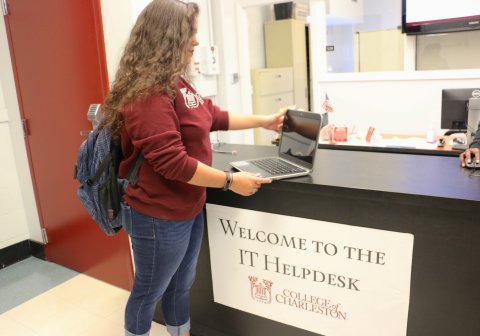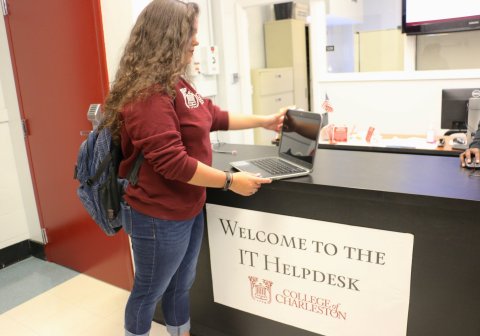SANTA CLARA, Calif.--(BUSINESS WIRE)--Aruba, a Hewlett Packard Enterprise company (NYSE: HPE), today announced that the College of Charleston, the oldest college in South Carolina and one of the oldest in the United States, has deployed an Aruba mobile-first network to deliver secure, high-performance wireless access across its 900 acre urban campus including 130+ buildings, outdoor meeting areas, its plantation research area, athletic fields and arenas. The new infrastructure not only delivers a measurably greater user experience but also reduces IT workloads and enables centralized management to allow IT more time to focus on strategic projects.
Founded in 1770, College of Charleston is dedicated to preserving its historic campus, but wanted to bring its aging technology into the 21st century. The College needed to replace an underperforming Xirrus network with a reliable Gigabit Wi-Fi network, and expand coverage in new buildings with higher bandwidth requirements. According to Jason Trinklein, Wireless Engineering Manager for College of Charleston, the wireless network must perform like any other utility.
“You can’t run a campus without an active water supply or electricity,” said Trinklein. “Increasingly, you can’t run a campus without a reliable wireless network either.”
Some of the challenges Trinklein faced with the College’s existing network included constant service problems due to bugs in the infrastructure, failing hardware, poor manageability, and a lack of visibility into network problem spots, channel utilization and user performance. These issues led to frequent complaints regarding Wi-Fi performance from students and staff, and much of IT’s time and resources focused on help desk tickets.
To address these problems, Trinklein and the IT team ran a Proof of Concept evaluation with Xirrus, Ruckus and Aruba in what Trinklein calls a “wireless shoot-out.” According to Trinklein, Aruba emerged as the clear winner.
“Aruba clearly delivered higher bandwidth, more powerful and pervasive connectivity, and with AirWave network management, allowed our team to not only identify network problems, but to be proactive in detecting where coverage problems might occur, ahead of time,” Trinklein said.
The College installed over 1,100 Aruba indoor and outdoor access points, using the latest ArubaOS 8 software, along with AirWave network management which Trinklein says is key to the team’s ability to monitor and manage the network’s performance and radio resources effectively. In particular, Trinklein considers Aruba’s AirMatch feature to be “second to none” in helping the College better plan and assign the RF for their campus network.
“The machine learning algorithm in AirMatch has been so effective,” he noted. “It automatically optimizes the radio resources – so we can even run some classrooms at 80 MHz channel width – which is unheard of in the academic environment.”
The result is improved productivity and reduced costs for the College’s IT team, as well as more reliable connectivity for users across the campus. IT has seen a dramatic decrease in help desk tickets and even receives frequent compliments on the wireless network. The College’s classrooms – in particular the Computer Science and Business departments which run advanced applications and make frequent use of Apple TVs – are now experiencing more dependable wireless connectivity at high capacity, and can support projects such as the College’s student-led entrepreneurial program which had been hampered previously by the old wireless infrastructure.
College of Charleston has also extended its coverage to TD Arena, a 5,500-seat basketball arena, to give high-speed Internet to students attending games. Trinklein says the IT team is also evaluating using their location-ready wireless access points with Aruba Beacons and the Meridian Mobile App Platform to deliver turn-by-turn directions and proximity notifications in dining halls and art exhibition areas, as well as Aruba Asset Tags for easier and more automated inventory of campus computers. The College is also seeing increasing demand for digital signage and ticket scanners in their athletics facilities and are determining how to integrate these, and other IoT devices and applications, onto the network.
“With a reliable and high-performing wireless foundation, we’re not only delivering what students and faculty need now, but we’re finally able to look ahead to the kinds of innovative applications and services that could be possible in the future,” said Trinklein.
About Aruba, a Hewlett Packard Enterprise company
Aruba, a Hewlett Packard Enterprise company, is a leading provider of next-generation networking solutions for enterprises of all sizes worldwide. The company delivers IT solutions that empower organizations to serve the latest generation of mobile-savvy users who rely on cloud-based business apps for every aspect of their work and personal lives.
To learn more, visit Aruba at http://www.arubanetworks.com. For real-time news updates follow Aruba on Twitter and Facebook, and for the latest technical discussions on mobility and Aruba products visit Airheads Social at http://community.arubanetworks.com.





